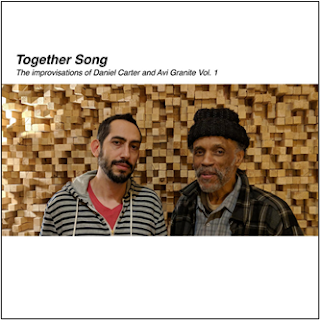Continued from yesterday.
By Nick Ostrum and Gary ChapinDaniel Carter and Avi Granite – Together Song (Pet Mantis Records, 2021) ***½
Nick:
Here is another duet, this one recorded in 2018. At 36 minutes, it is also
another brief one. Together Song is a collaboration
between Carter and guitarist Avi Granite. Despite the electrification, this
release is a loungier effort than Carter’s duo with Ackerely. Granite
partakes in flights here and there, but much of his contribution gravitates
toward classic jazz guitar progressions. Those tend to serve as the canvas
on which Carter riffs romantically. Indeed, Carter seems to restrain his
work to the softer, more brittle elements of his instruments in ways that
one only glimpses on Friendship and Dark Matrix, though
this approach may be more in line with the barroom balladeering of Familiar Roads. Honestly, this is not my favorite of the bunch,
but much of that has to do with my own tastes - I am ambivalent about jazz
guitar—and the unfinished nature of these pieces - they sound like one-off
collaborations, often enough to their benefit, though they sometimes sound
incomplete expressions of a mood or thought—rather than any lack of
inspiration. This inspiration really shows on the final and longest track,
“When We,” wherein the musicians really start to examine the hazy and
dreamy soundworld they only approach in the first two pieces.
Daniel Carter and Jim Clouse, Playing Retention (Mahakala Music, 2021) ****
Gary : Your use of the word “soundworld” really does highlight the fact that each of these albums, despite being a “similar” structure (e.g., the duet), creates a unique soundworld. This duet, Carter and multi-instrumentalist and producer Jim Clouse, is the only one of the set to go into barn burning territory. It doesn’t spend all its time there, but the opening drum/tenor duet does bring me back to the partnerships of Coltrane and Rashied Ali or Dewey Redman and Ed Blackwell. A lot of energy. Jim Clouse on winds, drums, and piano is having a great time and you can hear it. Carter on winds and piano shifts between voices like someone who feels at home everywhere. He’s not “doubling” on any of these instruments. They shift roles from track to track. Here’s the listing from Mahakala:
Track 1. Carter - Tenor Sax, Clouse - Drums
Track 2. Carter - Trumpet, Clouse - Soprano Sax
Track 3. Carter - Piano, Clouse - Tenor Sax
Track 4. Carter - Alto Sax, Clouse - Drums
Track 5. Carter - Clarinet, Clouse - Clarinet
Track 6. Carter - Soprano Sax, Clouse - Piano
Track 7. Carter - Drums, Clouse - Tenor Sax
It makes for a timbrally rich album. The two clarinet duet is really quite
evocative. This is Clouse’s first time playing in a free jazz setting, and
you wouldn’t know it. You could say Carter is generous in partnering with
all of these relatively young players in duet, but I’d rather think he’s very curious. He seems always to be looking for improv
interlocutors to challenge and fascinate him. He succeeds here.
Daniel Carter and Ra Kalam Bob Moses – Off World Meditations (Ra-Kalam Records, 2021) ****½
Nick : I am glad you brought up the question of intergenerational collaboration and those two classic duos. This next one, Off World Meditations, is a recording by Carter and percussionist Ra Kalam Bob Moses. Off World is a rekindling of collaboration that began in 1973, right between those two sessions. Still, the energy and effect of this album is so different from those captured on Interstellar Space and Red and Black in Wilisau and is quite different from Carter’s other recent output. I am not sure whether these guys are meditating on the stars or examining stages of consciousness or riffing on more terrestrial wonders, but they bridge the celestial/numinous/natural boundary compellingly. The longest track runs less than 6-and-a-half minutes, meaning each “spontaneous composition” (per Moses) is a short, direct statement. Given the improvisatory nature of these pieces, moreover, they are also surprisingly complete statements. The musicians make their point or shape their sonic vision and move on. Several pieces layer Carter’s horns. Others, such as Rising in Love, sound like a full quartet, replete with churning bass, atmospheric percussion, and entwining sax and flute. Through it all, however, Moses paddles out his ensorcelling polyrhythmic atmospheres and Carter weaves his enchanting melodies throughout them to create a fabric that is alternately simple and complex, comprehensible and perplexing. This might just be my favorite release of the bunch.

















0 comments:
Post a Comment